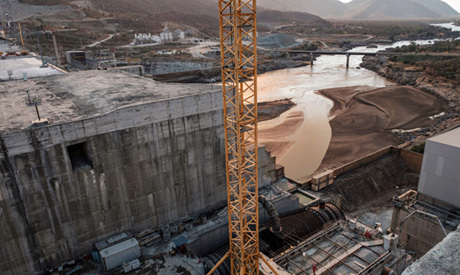
File Photo: A general view of the Blue Nile river as it passes through the Grand Ethiopian Renaissance Dam (GERD), near Guba in Ethiopia, on December 26, 2019 (Photo: AFP)
Egypt said on Saturday that the revived negotiations on the disputed Grand Ethiopian Renaissance Dam (GERD) are faltering, blaming what it described as Ethiopia’s “intransigence” during the latest meetings between the water ministers of Cairo, Addis Ababa and Khartoum.
In statements to reporters, the Egyptian Ministry of Water Resources and Irrigation spokesman said he is not “optimistic about the prospects of achieving a breakthrough during the ongoing negotiations on the Grand Ethiopian Renaissance Dam.”
The signaled collapse of talks comes a few days after Egypt, Ethiopia and Sudan began renewed negotiations on the GERD brokered by Khartoum in the latest bid to seal a deal on the controversial dam, after talks stalled last February during US sponsored meetings in Washington. The Washington meetings had resulted in a draft agreement that only Egypt initialed.
The latest talks come with a four-day timeframe, from 9 to 13 June, pressed by Cairo to reach an agreement on the filling and operation of the dam.
The talks have seen differing statements on Thursday, with Addis Ababa saying there had been an agreement to compare technical documents and to focus on the outstanding points of difference, while Cairo expressed concerns that Addis Ababa was backtracking on previous negotiations.
According to the spokesman’s statements on Saturday, Ethiopia presented during Thursday’s meeting what he described as a “deeply troubling document that is both technically unsound and legally inadequate,” despite the “considerable flexibility” by Egypt on a compromise text prepared by Sudan as a possible basis for negotiations.
“This document, which both Egypt and Sudan rejected, confirms that Ethiopia lacks the requisite political will to conclude a fair agreement on the GERD and reveals its intention to exploit transboundary water resources in an unrestrained and unregulated manner and without taking into consideration the rights and interests of downstream communities and states,” he said.
The “disturbing” Addis Ababa-prepared document would have downstream states “sign-away their riparian rights and recognise an Ethiopian right to exercise unfettered unilateralism both in the use of the Blue Nile and during the filling and operation of the GERD.”
Such a document would nullify all agreements made by the three countries in almost a decade of talks, including agreements reached during recent rounds of talks held in the attendance of the US and World Bank, the spokesman said.
It provided no guarantees to protect downstream states against possible harm due to the filling and operation of GERD, according to the spokesman, who said that per the document, Addis Ababa would enjoy a right to unilaterally amend rules governing the filling and operation of the dam depending on its energy and water needs without consideration of co-riparians interests.
“This text is clearly an attempt to establish a fait accompli. Ethiopia’s position is that Egypt and Sudan should either sign a text that would make them hostages to Ethiopia’s will and whim, or accept Ethiopia’s decision to unilaterally fill the GERD,” he said.
The spokesman described the Ethiopian position as “unfortunate and not reflective of the spirit of cooperation and good neighborliness that ought to govern relations between co-riparians and fellow African countries.”
The faltering of talks is expected to take its toll further on Cairo and Addis Ababa’s relations, resulting in a constant tug-of-war and accusations over the collapse of talks.
The growing conflict in the past months has led to a diplomatic war of words between Cairo and Addis Ababa that landed at the UN Security Council.
Cairo had demanded ahead of the meetings last week for a timeframe for the technical talks with Ethiopia and Sudan on the dam, according to a statement by the Egyptian National Security Council chaired by Egyptian President Abdel-Fattah El-Sisi.
It said a timeframe for the talks was crucial so as to not allow talks from becoming “a new tool for stalling or evading the obligations of the Declaration of Principles of 2015.”
Ethiopia hopes the massive $4.8 billion megaproject on the Blue Nile, which has been under construction since 2011, will allow it to become Africa’s largest power exporter.
Egypt receives an annual release of 55.5 billion cubic metres from its High Aswan Dam, while it requires over 80 billion cubic metres to meet its needs. The country bridges the gap by water recycling and reuse.
Cairo fears the dam will diminish its water supply from the Nile, on which it relies for the vast majority of its fresh water.
The populous country currently has a water share of around 570 cubic metres per person annually, well below the water scarcity level of 1,000 cubic metres per person per year. The figure is expected to drop further to 500 cubic metres by 2025.
Short link: